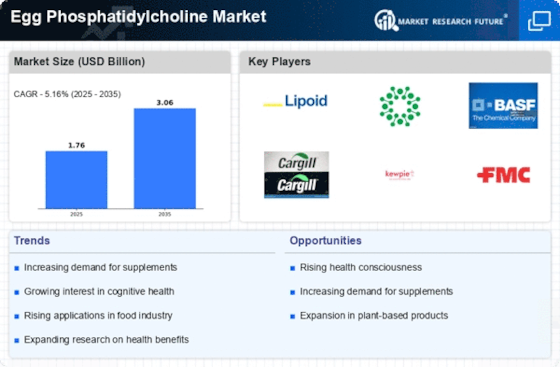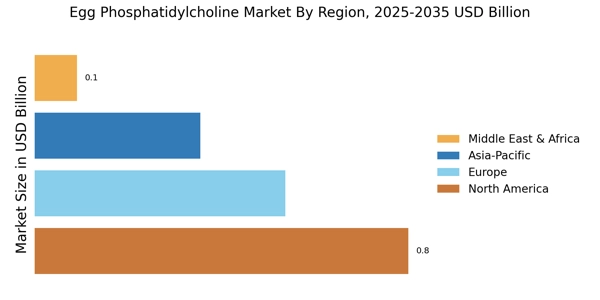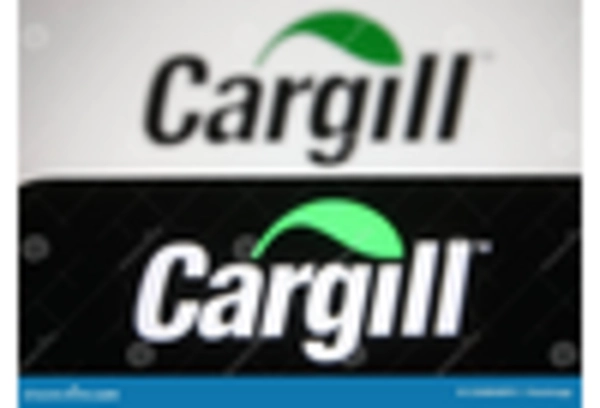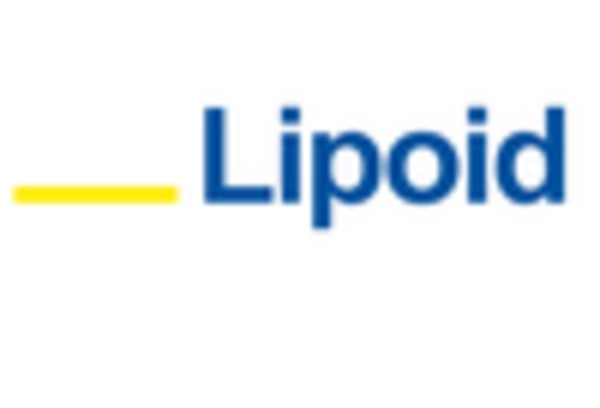Increasing Demand for Nutraceuticals
The egg phosphatidylcholine Market is experiencing a notable surge in demand for nutraceuticals, driven by a growing awareness of health and wellness among consumers. As individuals increasingly seek dietary supplements that promote cognitive function and liver health, phosphatidylcholine derived from eggs has emerged as a preferred choice. Market data indicates that the global nutraceuticals sector is projected to reach USD 500 billion by 2027, with phosphatidylcholine playing a pivotal role in this growth. This trend is likely to bolster the Egg Phosphatidylcholine Market, as manufacturers innovate to meet consumer preferences for natural and effective health solutions.
Rising Popularity of Functional Foods
The Egg Phosphatidylcholine Market is benefiting from the rising popularity of functional foods, which are designed to provide health benefits beyond basic nutrition. As consumers become more discerning about their food choices, there is a marked shift towards products that enhance cognitive performance and support overall well-being. The functional food market is anticipated to grow at a CAGR of 8% over the next five years, with egg phosphatidylcholine being a key ingredient in various formulations. This trend suggests a promising future for the Egg Phosphatidylcholine Market, as food manufacturers increasingly incorporate this ingredient to cater to health-conscious consumers.
Expansion of Dietary Supplements Market
The Egg Phosphatidylcholine Market is poised for growth due to the expansion of the dietary supplements market. As consumers prioritize preventive healthcare and seek to enhance their nutritional intake, the demand for supplements containing phosphatidylcholine is on the rise. Recent data indicates that the dietary supplements market is expected to surpass USD 300 billion by 2025, with phosphatidylcholine being a sought-after ingredient for its cognitive and liver health benefits. This expansion presents a significant opportunity for the Egg Phosphatidylcholine Market, as manufacturers strive to develop innovative formulations that cater to the evolving needs of health-conscious consumers.
Growing Applications in Pharmaceuticals
The Egg Phosphatidylcholine Market is witnessing a growing interest from the pharmaceutical sector, where phosphatidylcholine is recognized for its potential therapeutic benefits. It is increasingly utilized in drug formulations aimed at enhancing bioavailability and improving the delivery of active ingredients. Market analysis suggests that the pharmaceutical industry is projected to reach USD 1.5 trillion by 2026, with phosphatidylcholine being a valuable component in various formulations. This trend indicates a promising avenue for the Egg Phosphatidylcholine Market, as pharmaceutical companies seek to leverage the benefits of this ingredient in their product development.
Technological Advancements in Extraction Methods
Technological advancements in extraction methods are significantly influencing the Egg Phosphatidylcholine Market. Innovations in extraction techniques, such as supercritical fluid extraction and enzymatic processes, enhance the purity and yield of phosphatidylcholine from egg sources. These advancements not only improve product quality but also reduce production costs, making it more accessible to manufacturers. As the market for phosphatidylcholine expands, these technologies are likely to play a crucial role in meeting the increasing demand for high-quality egg-derived products. This evolution in extraction methods could potentially reshape the competitive landscape of the Egg Phosphatidylcholine Market.

















